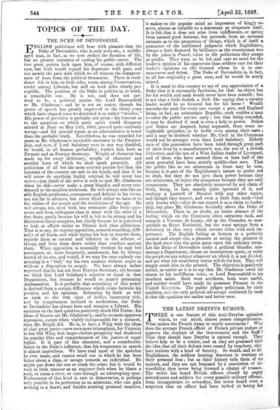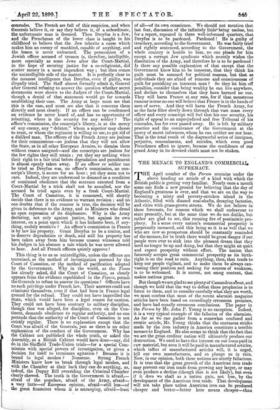THE LATEST DREYFUS RUMOUR.
THERE is one feature of this Anti-Dreyfus agitation. which, to our mind, almost passes comprehension. What makes the French Army so nearly unanimous.? Why. does the average French officer or French private endure or approve the conduct of the Government and the Staff ? That they should hate Dreyfus is natural enough. They believe him to be a traitor, and as they are possessed with the idea that all their defeats were caused by treachery, they hate traitors with a kind of ferocity. So would, and so do. .• Englishmen, the .soldiers -hunting deserters in wartime- • their personal *foes ; but as their history -tells them of np:, traitors, and they are not bemused by a conviction -of in- vincibility, they 'never bring forward a charge of treason.. The writer has heard British officers abused by angry • subordinates and soldiers for every possible military Offence, from- incompetence to cowardice, but -never heard even a suspicion that an officer had been bribed to betray his comrades. The French are full of this -suspicion, and when Generals believe it, or say they believe it, of a subordinate, the unfortunate man is doomed. Then Dreyfus is a Jew, and the Frenchman of the lower class is taught in his childhood to believe that the Jew inherits a curse which makes him an enemy of mankind, capable of anything, and the lesson is never unlearned. The persecution of a Jewish officer accused of treason is, therefore, intelligible, more especially as some Jews after the Court-Martial, in the hope of securing justice for a co-religionist, did scatter money in a most imprudent way ; but then comes i the unintelligible side of the matter. It s perfectly clear to the meanest intelligence that Dreyfus, even if guilty, was illegally tried. The Staff almost formally admit it, General after General refusing to answer the question whether secret documents were shown to the Judges of the Court-Martial, though a denial of that statement would go far towards establishing their. case. The Army at large must see that this is the case, and must see also that it concerns them directly and most closely. If an officer can be condemned on evidence he never heard of, and has no opportunity of rebutting, where is the security for any soldier ? The officer's commission, the conscript's liberty, is at the mercy of any enemy, any " delator," whom a superior may choose to trust, or whom the regiment is willing to use, to get rid of a disliked man The officers of the French Army are jealous for their commissions—so jealous that they will not allow the-State, as in all other European Armies, to dismiss them without reason assigned—and the conscripts are jealous for the few rights they still retain ; yet they say nothing when their right to a fair trial before degradation and punishment is almost openly taken away. If an officer or soldier can be tried as Dreyfus was, no officer's commission, no con- script's liberty, is secure for an hour ; yet they seem not to care. Indeed, they are understood to demand as a condition of continued obedience that the sentence extorted from a Court-Martial by a trick shall not be annulled, nor the accused be tried again even by a fresh Court-Martial. The Court of Cessation, it is rumoured, will shortly decide that there is no evidence to warrant revision ; and no one 'doubts that if the rumour is true, the decision will be given in deference to the Army, and to Ministers who dread an open expression of its displeasure. Why is the Army declaring, not only against justice, but against its own interest, on a point upon which it has hitherto been, if any- thing, unduly sensitive ? An officer's commission in France is by law his property. Grant Dreyfus to be a traitor, and to deserve degradation or death, and still his property has been taken away from him because unseen witnesses told his Judges in his absence a tale which he was never allowed to hear. , And all French officers quietly approve !
This thing is to us as unintelligible, unless the officers are terrorised, as the method of investigation pursued by the Court of Cessation, or the method of pacification adopted by the Government. Why in the world, as the TEMAS has already asked, did the Court of Cessation, as clearly appears from the evidence republished in the Figaro, permit the Generals to refuse to answer its questions ? Officers have no such privilege under French law. Their answers could not criminate themselves, even if that had been in France legal ground for the refusal. They could not have imperilled the State, which would have been a legal reason for caution. They could not have been contrary to military discipline, though that• was alleged, for discipline, even on the Con- tinent, demands obedience to regular authority, and no one pretends that the authority of the Court of Cessation is not strictly regular. There is no explanation except that the Court was afraid of the Generals, just as there is no other explanation of the conduct of the Government. Why has the Cabinet not published the whole truth, or asked the Assembly, as a British Cabinet would have done—nay, did do in the Sheffield Trade-Union trials—for a special Com- mission with special powers of investigation, or given a decision for itself to terminate agitation ? Because it is bound in legal meshes? Nonsense. Strong French Ministers know how -to break through legal meshes, and with the Chamber at their back they can do anything, as, indeed, the Dupuy Bill overriding the Criminal Chamber clearly showed. The truth is the Government is afraid,— afraid of the populace, afraid of the Army, afraid— a very little—of European opinion, afraid—still less—of the great financiers whom it is estranging, afraid—least of all—of its own conscience. We should not mention that last fear, discussion of the infinitely little being useless, but for a report, repeated in three well-informed quarters, that Dreyfus is to be pardoned. Pardoned He is guilty of treachery, according to the Government. He was fairly tried and rightly sentenced, according to the Government, the whole country is hostile to him, no one pleads for him except a corrupt Jew syndicate which secretly wishes the dissolution of the Army, and therefore he is to be pardoned Is there any possible explanation of that except that the Government know him to be innocent, that they think his guilt must be assumed for political reasons, but that as individuals they are afraid of remorse and consciousness of guilt for punishing an innocent man ? So they let him off penalties, consider that being wealthy he can live anywhere, and declare to themselves that they have harmed no one. They will harm France at any rate, for if that monstrous rumour is true no one will believe that France is in the hands of ' men of nerve. And they will harm the French Army, for as the facts filter slowly down through that vast mass every officer and every conscript will feel that his one security, his right of appeal to an unprejudiced and free Tribunal of his comrades, has for ever passed away. He is left by military practice and the connivance of the Government at the mercy of secret informers, whom he can neither see nor hear. That is the total result of the disgraceful series of intrigues, perjuries, concealments, and suicides, which even good Frenchmen affect to ignore, because the confidence of our grand Army in its devoted chiefs must not be shaken.







































 Previous page
Previous page